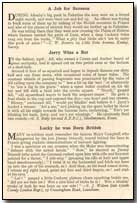Memoirs & Diaries - The Best 500 Cockney War Stories - Lucky He Was Born British and Other Stories
 Published in London
in 1921, The Best 500 Cockney War Stories
comprised, in the words of its newspaper publisher (The London Evening
News) "a remembering and retelling of those war days when laughter
sometimes saved men's reason".
Published in London
in 1921, The Best 500 Cockney War Stories
comprised, in the words of its newspaper publisher (The London Evening
News) "a remembering and retelling of those war days when laughter
sometimes saved men's reason".
The collection of short memoirs, some 500 in total, is divided into five categories - Action, Lull, Hospital, High Seas and Here and There. This page contains five stories from Lull, led by Lucky He Was Born British.
Other sections within the collection can be accessed using the sidebar to the right.
Lucky He Was Born British
Many ex-soldiers must remember the famous Major Campbell, who (supported by the late Jimmy Driscoll), toured behind the lines in France giving realistic demonstrations of bayonet fighting.
I was a spectator on one occasion when the Major was demonstrating "defence with the naked hands."
"Now," he shouted as Jimmy Driscoll (who acted the German) rushed upon him with rifle and bayonet pointed for a thrust, "I side-step" (grasping his rifle at butt and upper band simultaneously); "I twist it to the horizontal and fetch my knee up into the pit of his stomach, so! And then, as his head comes down, I release my right hand, point my fore and third fingers, so! and stab at his eyes."
"Lor!" gasped a little Cockney platoon chum squatting beside me, "did yer see that lot? Wot a nice kind of bloke he is! Wot a blinkin' stroke of luck he was born on our side!"
S. J. Wilson (late 1/2oth County London Regt.), 27 Cressingham Road, Lewisham
You Never Can Tell
SCENE: Turk trench, Somme, on a cold, soaking night in November, 1916.
A working party, complete with rifles, picks, and spades, which continually became entangled in the cats' cradle of miscellaneous R.E. wire, is making terribly slow progress over irregular trench-boards hidden under mud and water. Brisk strafing ahead promising trouble.
Impatient officer (up on the parapet): "For heaven's sake, you lads, get a move on! You're not going to a funeral!"
Cockney voice (from bottom of trench): "'Ow the dooce does 'e know!"
W. Ridsdale, 41 Manor Road, Beckenham, Kent
The Window Gazer
In the early part of 1915, when the box periscope was in great use in the trenches, we received a draft of young recruits. One lad, of a rather inquisitive nature, was always looking in the glass trying to find Jerry's whereabouts.
An old Cockney, passing up and down, had seen this lad peeping in the glass. At last he stopped and addressed the lad as follows:
"You've been a-looking in that bloomin' winder all the die, an' nah yer ain't bought nuffink."
E. R. Gibson (late Middlesex Regt.), 42 Maldon Road, Edmonton, N.9
"I Don't Fink"
After we landed in France our officer gave us a lecture and told us that our best pal in this world was our rifle. He warned us that on no account must we part with it.
A couple of nights later Gunner Brown, a Cockney, was on guard. When the visiting officer approached him and said, "Your rifle is dirty, gunner," he replied, "I don't fink so sir, 'cos I cleaned it."
"Give it to me," said the officer sternly, which Brown did.
Then the officer said, "You fool, if I were an enemy in English uniform I could shoot you."
To which Brown replied, "I don't fink you could, sir, 'cos I've got the blinkin' bolt in my pocket."
E. W. Houser (late 41st Division, R.F.A.) 22 Hamlet Road, Southend
Why the Attack Must Fail
NOVEMBER 1918. The next day we were to move up in readiness for the great advance of the 3rd Army.
Some of us were trying to sleep in a cellar when the silence was broken by a small voice: "I'm sure this attack will go wrong, you chaps! I feel it in my bones!"
It can be imagined how this cheerful remark was received, but when the abuse had died down, the same voice was heard again: "Yes, I knows it. Some blighter will step orf wi' the wrong foot and we'll all 'ave to come back and start again!"
"D" Coy., M.G.C. (24th Batt.), West Cliff
Next - The "Shovers" and four other stories
"Coffin Nails" was a term used by British soldiers to describe cigarettes.
- Did you know?
